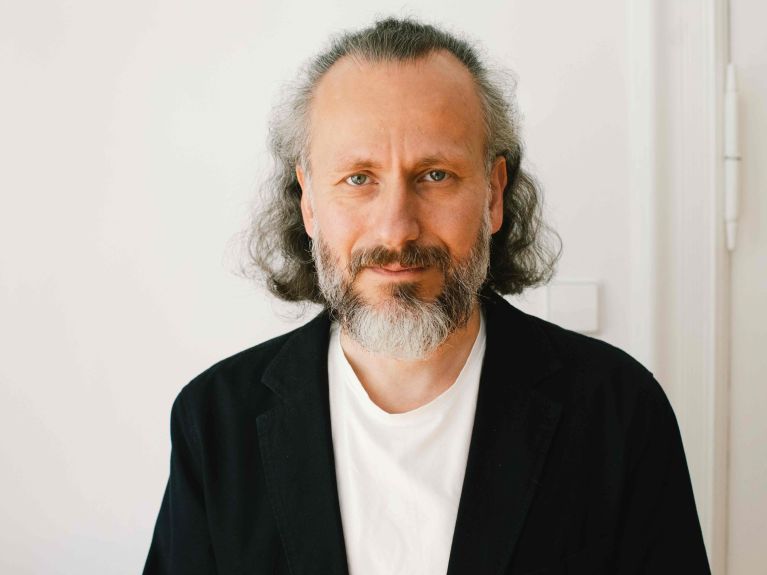“The majority of our users are young people from Russia.”
Sergei Lukashevsky, longstanding head of the Sakharov Centre in Moscow, talks about his work in exile in Germany and resistance to Russian propaganda.

Mr Lukashevsky, you have been head of the Sakharov Centre in Moscow for 15 years. It is named after the Nobel Peace Prize laureate and critic of the Soviet regime Andrei Sakharov. You and your family have been living in Germany since 2022, where you continue to campaign for human rights and freedom of expression in Russia. What can you achieve in exile?
Most of my colleagues at the Sakharov Centre now live in exile. Together we are trying to continue our media and education projects digitally. While we may be scattered across Israel, Georgia, France, Germany, Poland and other countries, we can still collaborate very effectively. Luckily we had already learned how to work online due to the pandemic. That experience is helping us now.
What projects are you working on?
On our YouTube channel ‘The Country and the World’, we discuss topics such as the consequences of the moral and political disaster of Russia’s invasion of Ukraine. Our education projects such as the human rights school and training for human rights lawyers are also continuing online. The majority of our users are young people from Russia. One important side-effect of the training is that people from all parts of the country can meet and network. They see that, unlike what Russian government propaganda says, they’re not alone.
We give people a platform to share uncensored and independent information.
You have also set up Radio Sakharov with support from the Correctiv research network. Is that a conventional radio station?
We’re extremely grateful for their support. Our colleagues at Correctiv are highly professional and have experience working with broadcasting in exile. Strictly speaking, Radio Sakharov is an app as apps are among the few parts of the media which the Russian regime has difficulty controlling. It can block YouTube and other channels, but to prevent someone downloading the app, the government would have to block all access to an app store. But they haven’t gone that far yet.
What do you report about on Radio Sakharov?
Unfortunately we don’t have the funds to broadcast conventional radio programmes, so we cooperate with partners such as the BBC Russian Service. At the same time, our listeners produce their own podcasts about current affairs in Russia, which we then publish through our app. We give people another platform to share uncensored and independent information.
What are the podcasts all about?
They cover many different topics. They’re not all about the war. They also cover social and cultural issues as well, such as how women are at risk of domestic abuse, which is a major problem in Russia.
How many people listen to Radio Sakharov?
In addition to the app we also publish our content on other digital channels such as Spotify and YouTube, and last year our programmes reached over 2.5 million listeners.
The Sakharov Centre was one of the last remaining independent institutions promoting free political discourse in Russia.
But in 2023 a Moscow court declared the centre was a “foreign agent” and disbanded it. How important was the centre before it was closed?
For 25 years the Sakharov Centre was one of the leading institutions promoting democracy in Russia. It was one of the last remaining independent institutions promoting free political discourse.
When did that change?
It happened by increments. In 2015 the government passed a law which classified organisations which received funding from abroad as foreign agents. The Sakharov Centre ended up on this list and has since been the subject of particular scrutiny. We even received death threats. Our work became the subject of increasing censorship and obstruction. Supporters of the regime blockaded our conferences and destroyed our exhibitions. It was also no longer impossible to hold events with schools, universities or state-funded museums. To mark the 100th birthday of Andrei Sakharov in 2021 we had planned exhibitions in regional museums, but they pulled out for fear of reprisals.
How did you deal with that?
The final straw was when the Duma, the Russian parliament, made “fake news” about the Russian army a criminal offence after the beginning of the war against Ukraine. At that point it was clear we could no longer continue our work. Some of the team went abroad to continue our projects in exile.
Are there any other civil society initiatives in Russia which are fighting for democracy?
There may not be many groups which still appear in public, but thousands of people are still campaigning for democracy and human rights. They are supporting Ukrainian refugees in Russia or helping find Ukrainian children who were kidnapped into Russia. They write letters to Ukrainian prisoners of war and political prisoners, even thought that is dangerous.
What’s next for Radio Sakharov?
Thanks to Reporters Without Borders we can now broadcast via satellite. They set up a project which reserves satellite frequencies for media in exile. It allows us to reach 4.5 million households in Russia.
What about your personal situation? Would you like to return to Russia?
Of course I hope we can reopen the Sakharov Centre in Moscow at some point. But I am currently the subject of criminal proceedings in Russia for spreading fake news. If I return home, I would be arrested immediately like Alexei Navalny.

